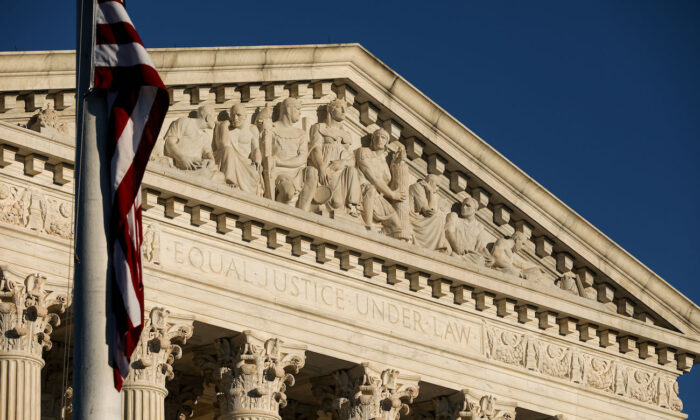
Both the Biden administration and a longtime illegal alien who claimed he mistakenly checked a box on a driver license application falsely indicating he was a U.S. citizen told the Supreme Court this morning that a federal appeals court erred when it ruled deportation should proceed.
How the high court rules in this case could create a standard regarding how much, if any, discretion judges have in cases in which aliens are seeking green cards.
appeal at hand is Patel v. Garland, court file 20-979, which comes from an Aug. 19, 2020 ruling by the U.S. Court of Appeals for the 11th Circuit. Scheduled for 60 minutes, the hearing lasted 92 minutes.
Pankajkumar S. Patel is a citizen of India who has resided in the United States for close to 30 years after entering the country unlawfully in February 1992. He is married to co-petitioner Jyotsnaben P. Patel and together they have three children.
Patel checked a box on a driver’s license application in Georgia erroneously identifying himself as a U.S. citizen, even though he was eligible for a license regardless of his lack of citizenship. He later tried to obtain lawful permanent resident status under a process authorized by Congress called “adjustment of status” that allows individuals physically present in the country to modify their immigration law status to that of a lawful permanent resident without having to leave the country.
More than 104,000 noncitizens adjusted status from inside the United States in the second quarter of fiscal 2021, a 22 percent drop from the same quarter the year before, according to a report by the U.S. Department of Homeland Security (DHS). “se significant drops coincided with COVID-19-related public health challenges that resulted in a reduction in the volume of in-person services provided at USCIS [i.e., U.S. Citizenship and Immigration Services] field offices in order to increase safety and accommodate social distancing protocols, as well as travel restrictions and closures in the United States and worldwide,” according to DHS.
In 2012, the government moved forward with deportation proceedings before an immigration judge. Patel argued his application for adjustment of status was a defense to deportation. DHS replied that the false claim of U.S. citizenship undermined his defense. immigration judge agreed.
A divided panel of the Board of Immigration Appeals (BIA) denied Patel relief, holding that he was inadmissible because, contrary to federal law, he “falsely represented” himself as a U.S. citizen for a benefit under state law.
Rejecting the government’s own position and that of nearly every other circuit, by a 9-5 vote the 11th Circuit determined that it lacked jurisdiction to review threshold eligibility findings for five major categories of discretionary relief from removal, such as whether Patel was inadmissible for mistakenly representing himself as a U.S. citizen. 11th Circuit separately held, contrary to a precedent-setting BIA decision, that the relevant federal law makes noncitizens inadmissible even if their misrepresentation of citizenship is immaterial to the government benefit sought, according to Patel’s petition filed with the Supreme Court.
Patel’s attorney, Mark C. Fleming, told the court during oral argument Dec. 6 that the government agrees that the law does not “bar review of the agency’s threshold determination that Mr. Patel is ineligible for adjustment of status.”
“That understanding is consistent with the statutory text, context, and history,” he said.
Congress could have barred review of any individual determination or a final order of removal, but it didn’t, Fleming said.
Justice Samuel Alito was skeptical. “I don’t understand where your argument is going,” he told the lawyer.
“What we want is the 11th Circuit to review our argument that the agency made an error in finding Mr. Patel ineligible. … And then, if that is reversed, it would go back to the agency that would then have to determine whether to grant relief … in the exercise of discretion.”
This is a developing story. It will be updated.
Pezou : Supreme Court Urged to Halt Deportation of Man Who Wrongly Claimed to Be a US Citizen